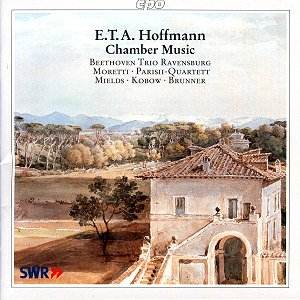E.T.A. Hoffmann was a ‘man for all seasons’.
In addition to composing music, he was an illustrator, writer,
and attorney who attained a position on the Court of Appeals in
Berlin. His primary legacy is in the area of German literature.
He wrote many novels and stories concerned with supernatural elements
and their impact on humans. Hoffmann’s most famous writings are
the stories on which the French composer Jacques Offenbach based
his opera "Tales of Hoffmann".
When I read a Hoffmann story, I think of the
supernatural operas of Carl Maria von Weber, not Hoffmann’s most
well known opera "Undine". The fact is that Hoffmann’s
reputation as a composer is slight, and recordings of his works
are infrequent. Even during his own lifetime, he had great trouble
getting his music published.
Personally, I find Hoffmann’s musical obscurity
a bit extreme. "Undine" is an excellent opera in the
German Romantic tradition, and the three chamber works on the
new CPO disc are testimony to Hoffmann’s ability to compose well-structured
music that expertly blends the different instruments and offers
ample variety. Of course, there are many dozens of other composers
of Hoffmann’s era who also composed attractive music. Some of
them, including Carl Maria von Weber, significantly surpass Hoffmann
in musical invention.
The question is whether the works on the CPO
disc warrant your attention. One of them definitely commands your
attention, and it is the Grand Piano Trio. Right from the first
few bars of the 1st Movement Allegro moderato, Hoffmann
asserts himself splendidly with tuneful phrases intricately tied
together and a vitality and zest for life that is irresistible.
The piece unfolds naturally and is delightful listening.
Attractive music making continues with the 2nd
Movement Scherzo in the key of E minor. Much of the Scherzo is
perpetual motion and quite exciting with dotted rhythms and jagged
edges. The 3rd Movement Adagio is a short one of only
twenty-three measures but well establishes its comfort and glowing
warmth. The Adagio also represents an introduction to the 4th
Movement Allegro vivace as it routinely changes key signatures
until leading into the final movement’s E major domain. As would
be expected, the 4th Movement is energetic and perky,
although some angst enters the musical landscape for contrast.
Overall, the Grand Trio is an excellent piece of music that compares
well to the chamber music of Spohr and Hummel, and the Beethoven
Trio Ravensburg plays the work with a vivacious and alert quality
that adds up to an outstanding performance by the ensemble.
Hoffmann’s Harp Quintet is a fine three-movement
composition of slightly lower quality than the Grand Piano Trio.
However, I have reservations concerning the demure projection
of the harp in the 1st Movement Allegro moderato. Isabelle
Moretti simply doesn’t offer the vitality expressed by the Parisii-Quartett,
and I find this somewhat odd given that she is fully energized
for the 3rd Movement Allegro.
I am less enamored of the Duets. Each of the
songs has a maudlin flavor with the same basic theme that "only
with you can I be happy". These songs remind me of Mozart’s,
but at a much-reduced level of inspiration. Further, although
the tenor Jan Kowbow has a moderately attractive voice, I don’t
feel it meshes well with the gorgeous tone of Dorothee Mields;
actually, I find Kowbow an annoying distraction from the many
pleasures to be had from Mields.
In summary, this new Hoffmann chamber music disc
has much to offer to those who enjoy classically oriented music
from the early 1800s. The Italian Duets are not very appealing,
but they take up less than 15 minutes of music. Recorded sound
is superb and particularly flattering to the vivid projection
of the stringed instruments.
I should warn that anyone expecting music along
the lines of the romantic opera "Undine" will be surprised
by the restraint and elegance of Hoffmann’s chamber music that
clearly is associated with the Classical period. If the chamber
works of Hummel and Spohr are appealing, Hoffmann can safely be
added to one’s music library. Not an essential acquisition by
any means, but attractive music to add to the evening’s entertainment.
Don Satz
